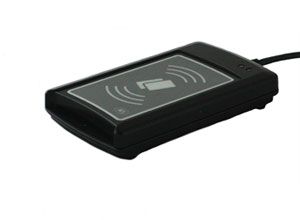Moscow subway NFC cards and MIFARE readers from ACS (ACR1281 и ACR122)

Here is my experience with ACS readers. Hope that will save time if you have to use them.
I worked with readers ACR1281 and ACR122.
Of cause you can use you NFC-enabled mobile phone but in my case I had to develop Windows application for work with Moscow subway system cards.
Python library
I used pyscard (module smartcard).
It uses PC/SC интерфейс,
so you need just very basic driver to send PC/SC commands to USB.
Ubuntu Linux
$ sudo apt-get install libacsccid1 pcscd pcsc-tools
After installation check:
$ pcsc_scan
PC/SC device scanner
V 1.4.27 (c) 2001-2011, Ludovic Rousseau <ludovic.rousseau@free.fr>
Compiled with PC/SC lite version: 1.8.14
Using reader plug'n play mechanism
Scanning present readers...
0: ACS ACR1281 1S Dual Reader 00 00
1: ACS ACR1281 1S Dual Reader 00 01
2: ACS ACR1281 1S Dual Reader 00 02
Thu Nov 16 12:49:20 2017
Reader 0: ACS ACR1281 1S Dual Reader 00 00
Card state: Card removed,
Reader 1: ACS ACR1281 1S Dual Reader 00 01
Card state: Card removed,
Reader 2: ACS ACR1281 1S Dual Reader 00 02
Card state: Card inserted, Unresponsive card,
If pcsc_scan does not see reader:
https://oneguyoneblog.com/2016/11/02/acr122u-nfc-usb-reader-linux-mint/
sudo nano /etc/modprobe.d/blacklist.conf
Add these two lines to the end of the file:
install nfc /bin/false
install pn533 /bin/false
Install Ubuntu dependancy libnfc:
http://nfc-tools.org/index.php?title=Libnfc
https://debian.pkgs.org/9/debian-main-i386/libpcsclite-dev_1.8.20-1_i386.deb.html
And install Python package:
sudo apt-get install swig libpcsclite-dev
sudo -H pip3 install pyscard
Windows
Install Python package:
$ python -m pip install pyscard
Install swig
Probably you need swig to compile Python library. You can find swig installer for Windows or use linux apt-get, as shown before.
ACR1281 multi interfaces
ACR1281 has three interfaces, for each card type (SAM, contact cards, contactless cards). You see them as three readers and the names are different in different OS.
from smartcard.System import readers
for reader in readers():
reader_name = str(reader)
if 'ACR1281' in reader_name and (reader_name.endswith('01') or 'PICC' in reader_name):
self.reader_type = 'acr1281'
break
if 'ACR122U' in reader_name:
self.reader_type = 'acr122'
break
else:
raise Exception('Not found supported reader')
# reader - to use
And after that reader.createConnection().connect()
Alternatively you can just wait for any reader that first read a card:
from smartcard.CardType import AnyCardType
def wait_for_card(timeout=0):
# Wait for card with ATR NXP card ISO 14443 Part 3 PICC (бесконтактные)
# (atr == reader.atr & mask, zeroes in mask filter out variative part,
# this part in atr equals zero)
cardtype = ATRCardType(
atr=toBytes('3B 80 80 01 80 4F 0C A0 00 00 03 06 03 00 00 00 00 00 00 00'),
mask=toBytes('FF F0 FF FF FF FF FF FF FF FF FF FF FF FF F0 FF FF FF FF 00')
)
return CardRequest(timeout=timeout, cardType=cardtype)
To connect to that reader wait_for_card().service.connection.connect().
And in any case you can send APDU command: connection.transmit(APDU).
Block reading in different readers
Both readers are from the same company but you have to use different parameters to read a block. Block this is MIFARE read unit, 16 bytes.
To read block:
- Save the read key in reader
- Auth block by the key (reader sends the key to smart card and it answers if you can read the block with the key)
- Read the block
For ACR122 you have to save key in address 0, but for ACR1281 - in address 0x20.
def save_key_in_reader(key):
KEY_STRUCTURE = 0 # volatile memory
if self.reader_type == 'acr122':
self.KEY_NUMBER = 0
else:
self.KEY_NUMBER = 0x20
load_key_command = toBytes(
'FF 82 {key_structure:02x} {key_number:02x} {key_length:02x} {key}'.format(
key_structure=KEY_STRUCTURE,
key_number=self.KEY_NUMBER,
key_length=len(key),
key=toHexString(key)
)
)
result, sw1, sw2 = connection.transmit(load_key_command)
if sw1 != 0x90:
raise Exception('Error saving key: {:02x} {:02x}'.format(sw1, sw2))